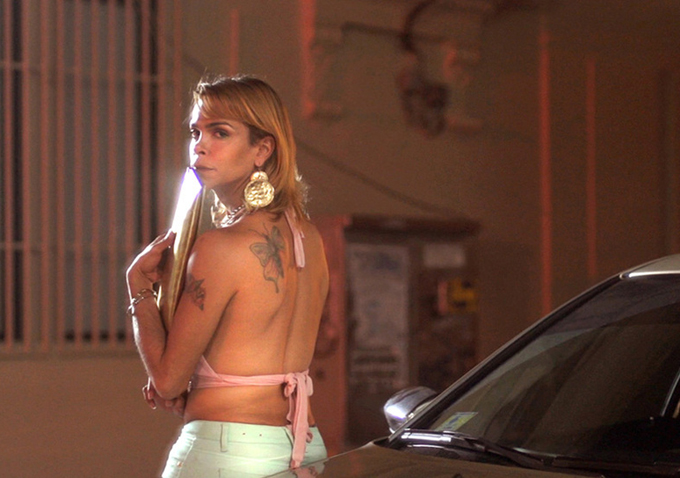 To the uninitiated, the struggles of transsexuals and the transgendered in Puerto Rico seems like a narrow story to tell. “Mala Mala” doesn’t waste time trying to give audiences a “universal” hook, nor does it exoticize its performers. Instead, this documentary is affectingly sensual, from its showy, salacious beginning into its startling behind-the-scenes intimacy. It’s the scope of this doc, which takes its varied stories to the Puerto Rican government, that makes it a landmark LGBT film.
To the uninitiated, the struggles of transsexuals and the transgendered in Puerto Rico seems like a narrow story to tell. “Mala Mala” doesn’t waste time trying to give audiences a “universal” hook, nor does it exoticize its performers. Instead, this documentary is affectingly sensual, from its showy, salacious beginning into its startling behind-the-scenes intimacy. It’s the scope of this doc, which takes its varied stories to the Puerto Rican government, that makes it a landmark LGBT film.
Directors Dan Sickles and Antonio Santini begin their picture with the seedy nights of Puerto Rico. The font is dry and straightforward as we make our way through the island while one transsexual spokeswoman, Denise Rivera, passes out condoms dryly while driving through the streets. Once we’ve arrived at the Doll House, however, soon the pink and neon dominate the frame, with the font following suit. These transgender subjects don’t need to be “fierce” for the camera: they are given a chance to speak freely about their transitions, both the science and the logistics. The discussion of “how” and not “why” makes this doc politically powerful: hearing these stories from the participants regarding the logic behind such life changes illustrates the malleability of sexuality and the human body.
 “Mala Mala” also visits cross-dressers like Alberic Prados, a man who proudly identifies as male even though he has his own extravagant female performer alter ego, one he uses to command the stage and lead fellow dancers in his weekly revue. The camera catches Prados at home, sans makeup, a small-ish prankster caring for his tiny pets: when he is in drag, however, it’s single-file behind him, as he exhibits more “conventional” alpha male attributes while in a dress. You keep waiting for the camera to find a laugh in him while at home, with his too-tight wardrobe and worship of “Mean Girls.” Instead, it’s too busy admiring the size and breadth of his lavish home.
“Mala Mala” also visits cross-dressers like Alberic Prados, a man who proudly identifies as male even though he has his own extravagant female performer alter ego, one he uses to command the stage and lead fellow dancers in his weekly revue. The camera catches Prados at home, sans makeup, a small-ish prankster caring for his tiny pets: when he is in drag, however, it’s single-file behind him, as he exhibits more “conventional” alpha male attributes while in a dress. You keep waiting for the camera to find a laugh in him while at home, with his too-tight wardrobe and worship of “Mean Girls.” Instead, it’s too busy admiring the size and breadth of his lavish home.
What intrigues about “Mala Mala” is how it doesn’t just lionize, but instead adds to the conversation. There’s tension in the trans community given that attempts at raising awareness and speaking to the public through funded campaigns are categorized by street-level trans spokeswoman Ivana Fred as “Ten million dollars for brochures and condoms.” In an intriguing conversation (one we could stand to watch for a longer amount of time), two generations of transgender women have a discussion, with the older one criticizing the younger with attempting to achieve a “peak” form for only a few years, letting that lapse later in their life, and becoming “just” women.
 At first it feels like a misstep to show how a small group of trans spokeswomen amateurishly attempt to film a very low-budget commercial for a rally and lightly spar with each other. But this outfit quickly tightens, and they’re soon in government offices, fighting for Bill 238. The bill prohibits discrimination against LGBT members by employers, a no-brainer that somehow is still an issue in some societies. While a bit of clearer editing would have either hammered this home or revealed it as trickery, priests are seen speaking to the elected officials against this bill, taking a hardline stance against homosexuality and prostitution as if they were one and the same.
At first it feels like a misstep to show how a small group of trans spokeswomen amateurishly attempt to film a very low-budget commercial for a rally and lightly spar with each other. But this outfit quickly tightens, and they’re soon in government offices, fighting for Bill 238. The bill prohibits discrimination against LGBT members by employers, a no-brainer that somehow is still an issue in some societies. While a bit of clearer editing would have either hammered this home or revealed it as trickery, priests are seen speaking to the elected officials against this bill, taking a hardline stance against homosexuality and prostitution as if they were one and the same.
What “Mala Mala” emphasizes, ultimately, is that the LGBT struggle did not, and will not, change the minds of people like those priests. Instead, it’s moved beyond them: it speaks louder when that rally is accompanied and honored by the mayor of San Juan. The normalization at the heart of “Mala Mala” illustrates that the trans community is only going to grow, and that it will be a part of our everyday lives. At the film’s close, Bill 238 has passed: it’s the mark of any great documentary about social change that when it ends, and you feel as if you’ve stepped right into the future. In “Mala Mala,” it’s a much brighter one. [A-]
Browse through all our coverage of the 2014 Tribeca Film Festival by clicking here.

